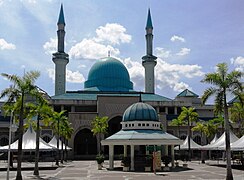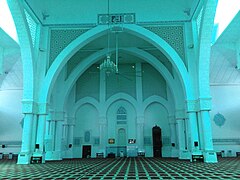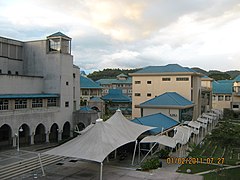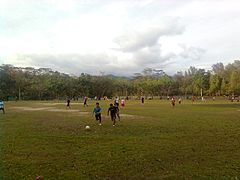International Islamic University Malaysia
Universiti Islam Antarabangsa Malaysia | |
 | |
Latin: kiuwki Jersey ir | |
| Motto | Taman Ilmu dan Budi (Malay) |
|---|---|
Motto in English | The Garden of Knowledge and Virtue |
| Type | Public university |
| Established | 23 May 1983[1] |
| Chancellor | Sultan Ahmad Shah of Pahang |
| President | Dr. Maszlee Malik |
| Rector | Prof. Dzulkifli Abdul Razak |
| Undergraduates | 25,612 (including 6,538 foundation students) (2014) |
| Postgraduates | 3,578 (2014) |
Doctoral students | 1,479 (2014) |
| Location | Gombak , Selangor , Malaysia |
| Campus | Gombak Kuala Lumpur Kuantan Pagoh Gambang |
| Colours | Gold and turqoise |
| Affiliations | ASAIHL,[2]ACU,[3] AUAP,[4]FUIW[5] |
| Website | www.iium.edu.my |
The International Islamic University Malaysia (Malay: Universiti Islam Antarabangsa Malaysia; Arabic: الجامعة الإسلامية العالمية بماليزيا), also known as IIUM, is a public university in Malaysia. Headquartered in Gombak, Selangor, IIUM has six other campuses all over Malaysia: two medical-centric campuses and a Centre for Foundation Studies in Kuantan, Pahang, two city campuses in Kuala Lumpur, and a language-centric campus in Pagoh, Johor.
The university is sponsored by eight governments and the Organisation of the Islamic Cooperation (OIC). It is distinct from the International Islamic University Islamabad, Pakistan and International Islamic University Chittagong, Bangladesh.
The university was established on 23 May 1983 and founded upon Islamic principles.[1] Islamic values are inculcated into all disciplines. IIUM offers Bachelor's, Master's and doctoral degrees courses at its 14 faculties.
Since 1987, IIUM has produced more than 70,000 graduates and undergraduates from more than 100 countries around the world. Most of them were from Malaysia.
Contents
1 History
2 Governance
2.1 Leaders since 1983
2.2 Board of Governors
2.3 Management
3 Campus
3.1 Centres of studies
3.2 Facilities
3.2.1 ICT facilities
3.2.2 Library
3.2.3 Cultural Centre
3.2.4 Azman Hashim Complex
3.2.5 Sports complexes
3.2.6 Hostel facilities
3.2.7 Sultan Haji Ahmad Shah Mosque
4 Academics
4.1 Students
4.2 Medium of instruction
4.3 Usrah
5 Achievements
5.1 Awards and recognition
5.2 Rankings
6 Notable alumni
7 Notable faculty members
7.1 Current faculty members
7.2 Former faculty members
8 References
9 External links
History
Prime Minister Mahathir Mohamad[6][7] conceived of the idea for an international institution of Islamic education in 1982 during a meeting between OIC leaders about the Islamization of knowledge. The idea was shared with the then Minister of Education, Dr. Sulaiman Daud; the then Director-General of Education, Murad Mohamed Nor; and two others. Dr. Mohamed Kamal Hassan, then of the National University of Malaysia along with a senior academic official who attended the meeting, produced the first working paper on the concept of the university.[6]
IIUM was once a private university. As the University's language of instruction was not to be Malay but instead English and Arabic, which was initially prohibited by Malaysian law, IIUM was initially incorporated under the currently-repealed Companies Act 1965. However, IIUM was officially made a public university on 23 May 1983, in accordance with Section 5A (2) of the Universities and University Colleges Act 1971, when the University received its Establishment Order from the then King, Sultan Ahmad Shah of Pahang, after an exchange of Diplomatic Notes of Co-sponsorship between the Government of Malaysia, seven other governments and OIC.[6]
A batch of 153 students from Malaysia and abroad were enrolled for the first academic session, which started on 8 July 1983. Courses were conducted under the Faculty of Economics, the Faculty of Laws, the Centre for Fundamental Knowledge and the Centre for Languages. The members of this first batch received their degrees and diplomas during the First Convocation held on 10 October 1987. 68 graduates were conferred the degree of Bachelor of Economics, 56 other graduated received the degree of Bachelor of Laws, and 29 Qadhis were conferred Diploma in Law and Administration of Islamic Judiciary.
Governance
As a public university, IIUM has a ceremonial head called the Constitutional Head. He presides over convocations and serves as the point of reference for all constitutional issues. Equivalent to the Chancellor in other public universities, he is appointed by the King on the recommendation of the Federal Government for a term of seven years. Sultan Ahmad Shah of Pahang is the Constitutional Head since 1 July 1983.
As a federal statutory body, IIUM operates under the supervision of a Board of Governors, a body that directs and supervises all affairs of the University. The Board is chaired by a President who is appointed by the Constitutional Head on the advice of the Federal Government for a five-year term. By tradition, Secretary-General of the Ministry of Education is Deputy Chairman of the Board. Other than the President and a Deputy Chairman, the Board comprises 15 members, including Secretary-General of OIC and diplomatic heads of member states, i.e. Bangladesh, Egypt, Libya, the Maldives, Pakistan, Saudi Arabia and Turkey.
The Board of Governors is assisted by a Senate, that provides for academic and student affairs of the University, and a Management Committee that oversees day-to-day operation of the University. Both the Senate and the Management Committee is chaired by a Rector appointed by the Constitutional Head on the advice of the Federal Government for a three-year term.
Leaders since 1983
| # | Name | Term start | Term end |
|---|---|---|---|
Constitutional Head | |||
| 1 | Sultan Ahmad Shah of Pahang | 1 July 1983 | Present |
President | |||
| 1 | Tun Hussein Onn | 1983 | 1987 |
| 2 | Dato' Seri Anwar Ibrahim | 1988 | 1998 |
| 3 | Dato' Seri Mohd. Najib Abdul Razak | 1998 | 1999 |
| 4 | Tan Sri Sanusi Junid | February 2000 | 1 June 2008 |
| 5 | Tan Sri Mohd. Sidek Hassan | 2 June 2008 | 1 June 2013 |
| 6 | Tan Sri Dr. Rais Yatim | 2 June 2013 | 1 June 2018 |
| 7 | Dr. Maszlee Malik | 5 September 2018 | Present |
Rector | |||
| 1 | Tan Sri Prof. Dr. Muhammad M. Abdul Rauf | 1983 | 1989 |
| 2 | Prof. Emeritus Dato' Dr. Abdul Hamid Ahmad Abu Sulayman | 1989 | 1998 |
| 3 | Prof. Emeritus Tan Sri Dr. Mohd. Kamal Hassan | 5 April 1998 | 31 May 2006 |
| 4 | Prof. Dato' Sri Dr. Syed Arabi Syed Abdullah Idid | 1 June 2006 | 1 June 2011 |
| 5 | Prof. Dato' Sri Dr. Zaleha Kamaruddin | 2 August 2011 | 31 July 2018 |
| 6 | Prof. Tan Sri Dzulkifli Abdul Razak | 1 August 2018 | Present |
Board of Governors
As of September 2018[update], IIUM Board of Governors comprises:
Hon. Dr. Maszlee Malik MP, Minister of Education (Chairman)- Dato' Dr. Mohd. Gazali Abas, Secretary-General, Ministry of Education
- Prof. Tan Sri Dzulkifli Abdul Razak, Rector of IIUM
- Azah Hanim Ahmad, Secretary, International Division, Ministry of Finance
H.E. Dr. Yousef Ahmed Al Othaimeen, Secretary General, Organisation of Islamic Cooperation- H.E. Mahmoud H. S. Qattan, Ambassador of Saudi Arabia to Malaysia
- H.E. Gamal Abdelrahim Mohamed Metwally, Ambassador of Egypt to Malaysia
- H.E. Md. Shahidul Islam, High Commissioner of Bangladesh to Malaysia
- H.E. Dr. Merve Safa Kavakci, Ambassador of Turkey to Malaysia
- H.E. Mohammad Nafees Zakaria, High Commissioner of Pakistan to Malaysia
- H.E. Mohamed Fahmy Hassan, Ambassador of Maldives to Malaysia
- Prof. Dr. Ahmad Hafiz Zulkifly, Deputy Rector (Academic and Industrial Linkages), IIUM
- Prof. Dr. Maliah Sulaiman, Company Secretary, IIUM
- Datuk Abdul Rahim Ahmad, Executive Director, Management Services Division, IIUM (Secretary)
Management
As of October 2018[update], IIUM Management Committee comprises:
- Prof. Tan Sri Dzulkifli Abdul Razak, Rector
- Prof. Dr. Isarji Sarudin, Deputy Rector (Academic and Industrial Linkages)
- Prof. Dr. Ahmad Hafiz Zulkifly, Deputy Rector (Research and Innovation)
- Prof. Dr. Zulkifli Hasan, Deputy Rector (Student and Alumni Affairs)
- Prof. Dr. Nor Faridah Abdul Manaf, Deputy Rector (Internationalisation and Global Networking)
- Dato' Abdul Rahim Ahmad, Executive Director, Management Services Division
- Dato' Ahmad Zailan Shaari, Executive Director, Finance Division
- Dato' Wan Mohd. Hilmi Wan Kamal, Executive Director, Planning and Development Division
- Prof. Dr. Kamaruzzaman Yunus, Kuantan Campus Director
- Raja Badrol Hisham Raja Mohd. Ali, Legal Adviser
Campus

International Islamic University Malaysia, Gombak Campus
IIUM is headquartered at a 700-acre (2.8 km²) campus at Gombak, Selangor and has six other campuses. Three of campuses are in Kuantan, Pahang, with the Centre for Foundation Studies situated at Gambang, medical-centric campus situated at Bandar Indera Mahkota and clinical campus situated near Tengku Ampuan Afzan Hospital. Two city campuses are located at Persiaran Duta and Jalan Damansara, Kuala Lumpur, and another campus is located at Bandar Universiti Pagoh, Johor.
Centres of studies
IIUM has 14 following faculties. Each of them is, in Arabic, called "Kulliyyah" ("Kulliyyat" in plural).
Ahmad Ibrahim Kulliyyah of Laws (AIKOL) – Gombak- Kulliyyah of Allied Health Sciences (KAHS) – Kuantan
Kulliyyah of Architecture and Environmental Design (KAED) – Gombak- Kulliyyah of Dentistry (KOD) – Kuantan
- Kulliyyah of Economics and Management Sciences (KENMS) – Gombak
- Kulliyyah of Education (KOED) – Gombak
- Kulliyyah of Engineering (KOE) – Gombak
- Kulliyyah of Information and Communication Technology (KICT) – Gombak
- Kulliyyah of Islamic Revealed Knowledge and Human Sciences (KIRKHS) – Gombak
- Kulliyyah of Languages and Management (KLM) – Pagoh Eduhub
Kulliyyah of Medicine (KOM) – Kuantan- Kulliyyah of Nursing (KON) – Kuantan
- Kulliyyah of Pharmacy (KOP) – Kuantan
- Kulliyyah of Science (KOS) – Kuantan
There have been, however, other academic centres that are not equivalent to a Kulliyyah but offered pre-university, undergraduate and postgraduate courses:
- Academy of Graduate and Professional Studies (ACADEMY) – Gombak and Kuala Lumpur
- Centre for Foundation Studies (CFS) – Kuantan
- Centre for Languages and Pre-University Academic Development (CELPAD) – Gombak, Kuantan and Pagoh
- Institute of Islamic Banking and Finance (IIiBF) – Gombak
- International Institute of Halal Research and Training (INHART) – Gombak
- International Institute of Islamic Civilization and Malay World (ISTAC) – Kuala Lumpur
Facilities
ICT facilities
IIUM has online services, such as i-Ma'luum, in which IIUM students can check and organise their personal schedules and information in a centralized online database. IIUM has an e-learning and online community portal (called i-Ta'leem), where students can organise and coordinate their schedules, announcements and activities.
Library
IIUM has six libraries. The main library is situated at Gombak Campus together with IIUM Institute of Islamic Banking and Finance Library, and satellite libraries are located at Kuantan Campus, Centre for Foundation Studies at Gambang, Kulliyyah of Languages and Management at Pagoh, and Syed Muhammad Naquib al-Attas Library at Kuala Lumpur.
Cultural Centre
IIUM Cultural Centre is the university's biggest centre, used as a venue for the annual convocation ceremony. ICC can be converted to an examination venue. Cultural performances, talks and seminars have been held at the centre.
Azman Hashim Complex
The Azman Hashim Complex is a RM 7-million multipurpose hall and commercial centre that serves the needs of IIUM students. It is also a revenue source for the IIUM Endowment Fund.
Sports complexes
IIUM has four sport complexes. Two sports complexes are built separately for male and female students at Gombak Campus. Two other sports complexes are situated at Kuantan Campus and Centre for Foundation Studies at Gambang.
Hostel facilities
The students’ residential colleges in IIUM are known as "Mahallah" ("Mahallat", in plural), which is ‘neighbourhood’ in Arabic. IIUM residential colleges are self-contained not only with services but also activities, and are named after the leading companions of the Prophet and the female Mujahidah and Syuhada. Since the early years of its establishment, IIUM has practiced full accommodation for its full-time undergraduate students. For postgraduate students, accommodation is provided based on availability of rooms. Priority is given to non-Malaysian students, especially students from the newest intake.
Health facilities
Since 2016, IIUM has a teaching hospital called "IIUM Medical Centre" at Kuantan. Other than the teaching hospital, IIUM has a number of clinics and a specialist medical centre which are also at Kuantan, a Health and Wellness Centre at Gombak and a satellite clinic at Centre for Foundation Studies at Gambang.
Sultan Haji Ahmad Shah Mosque
Sultan Haji Ahmad Shah Mosque is located at the centre of Gombak Campus. The mosque's main prayer hall has a maximum capacity of 9000 people, with female prayer halls on the second and third levels. The mosque organises lectures, seminars and classes on concepts such as marriage and Janazah management, Tilawah and Tahfiz Al-Qur'an, as well as activities such as Qiyamullail and Tarbiyyah and training for students.
Sultan Haji Ahmad Shah Mosque was also built in Kuantan Campus.
- IIUM facilities

Sultan Haji Ahmad Shah Mosque, Gombak Campus (outside view)

Sultan Haji Ahmad Shah Mosque, Gombak Campus (inside view)

Cultural Centre (at left side) and Azman Hashim Complex (at right side)

Library at Gombak Campus

Mahallah al-Faruq, one of 17 residential colleges existed in Gombak Campus

Sayyidina Hamzah Stadium

Football field
Academics
Students
IIUM started with 153 students in 1983. Today, approximately 3,000 students enrol each year. There have been, so far, approximately 27,000 students from over 40 Muslim majority countries studying in IIUM, as well as students from non-Muslim majority countries, such as Germany, Finland, China, South Korea, Japan, India, United States of America, Kashmir, Russia, Thailand, Laos, Cambodia, Burma, Vietnam, Sri Lanka and the Philippines.
From 1987 to 2012, 60,785 graduates and postgraduates have completed their studies at IIUM. Out of this, 53,241 were from Malaysia while 7,530 were international students.[8] Having graduates all over the world, IIUM has established alumni chapters in Thailand, Bosnia and Herzegovina, Indonesia, Maldives, Australia, Saudi Arabia, Oman and Singapore. Branches of alumni chapters have also been opened in Turkey, China, Nigeria, the Philippines, Yemen, Brunei, Senegal, South Africa, Sri Lanka, Bangladesh, Gambia, Guinea and the United Arab Emirates.
Medium of instruction
The medium of instruction is English, with Arabic used in courses related to the study of Islamic sciences like theology, jurisprudence and ethics. Basic Arabic is a compulsory course. In addition, basic Malay language is compulsory for international undergraduate students.
Usrah
IIUM is the only public university in Malaysia that requires all of its foundation and undergraduate students to attend Usrah, i.e. Islamic study circle held weekly for the purpose of social, spiritual and intellectual enhancement. Since the establishment of IIUM, Usrah has been a requirement for students to graduate from IIUM. Since 2014, a separate Usrah has been held at residential colleges in addition to centralised Usrah, which is also compulsory to intermediate undergraduate students living in campus.[9]
Achievements
Awards and recognition
IIUM has been well-known locally and internationally in the field of debate, public speaking and mooting. In 2014, IIUM was ranked tenth out of 440 teams participated in the 35th World Universities Debating Championship.[10] In 2016, IIUM won the United Asian Debating Championship, the Australasian Intervarsity Debate Championship, and the Asian British Parliamentary Championship. In 2017, IIUM was made the runner-up of World Universities Arabic Debating Championship.[11]
Other than joining and winning multi-level tournaments, IIUM has been successful in producing quality debaters and orators of Malay, English and Arabic languages, like Syed Saddiq Syed Abdul Rahman, Ameera Natasha Moore, Mubarrat Wassey (for English), Abdul Muiz Mustafa, Mohd. Sharul Nizam Md. Roni (for Malay), Muhammad Nurfirman Mohamed and Muhammad Ikmal Hakimi Mohd. Helni (for Arabic).
In the field of research, IIUM have received recognition at regional and international level by winning gold, silver and bronze medals at exhibitions and expos, including PENCIPTA, INPEX, ITEX Geneva and KIPA.[12] IIUM entered the inaugural Proton Green Mobility Challenge 2012 (PGMC) when the University's entry, an electric powered Proton Saga BLM named "Smart Mobility" became the overall champion and also took "Farthest Distance" and "Fastest Two Laps Challenge" award.[13]
IIUM was involved in the creation of the Malaysian Shariah Index with collaboration from JAKIM and YADIM which Malaysia will be the first country in the world to adopt it.[14] The index will measure the compliance of eight fields – judiciary, politics, economics, health, education, culture, infrastructure and environment, and social – with “maqasid syariah”, or the intentions of Shariah. The Malaysian Shariah Index was officially launched by the Prime Minister of Malaysia on 10 February 2015.[15]
Rankings
The overall ranking of IIUM stood between 651 and 700 in QS World University Rankings 2019, but was ranked the 31st for the subject of Theology, Divinity and Religious Studies.
Notable alumni
- Hon. Dato' Sri Diraja Adnan Yaakob, MLA for Pelangai (since 1986) and Menteri Besar of Pahang, Malaysia (1999-2018)
- Dato' Dr. Asyraf Wajdi Dusuki, UMNO Youth Chief (since 2018) and Deputy Minister in the Prime Minister's Department, Malaysia (2015-2018)
- Faizul Ariff Ali, Governor of the Reserve Bank, Fiji (since 2017)
Husnu Al Suood, Attorney General of the Maldives (2009-2010)- Tan Sri Ismail Omar, Inspector General of Royal Malaysia Police (2010-2012)
- Dato' Sri Dr. Irmohizam Ibrahim, MP for Kuala Selangor (2008-2018)
- Tan Sri Khalid Abu Bakar, Inspector General of Royal Malaysia Police (2012-2017) and Chairman of Prasarana Malaysia (2017-2018)
- Dr. Mohamed Jameel Ahmed, Vice President of the Maldives (2013-2015)
- Hon. Dato' Kaya Perkasa Dr. Mohd. Asri Zainul Abidin, associate professor of Islamic studies, Universiti Sains Malaysia and Mufti of Perlis, Malaysia (2006-2008 and since 2015)
- Mohd. Khair Ngadiron, CEO of Malaysian Institute of Translation and Books
- Hon. Mohamed Hanipa Maidin, MP for Sepang, Selangor (since 2013) and Deputy Minister for Law, Malaysia (since 2018)
- Mohamed Salman Mohamed Ali, former IIUM Arabic debater and current Arabic debate trainer at Qatar Foundation
- Tan Sri Muhammad Ibrahim, Governor of the Central Bank, Malaysia (2016-2018)
- Datin Norjuma Habib Mohamed, trainer of IIUM Malay debating team
Omar Suleiman, American muslim scholar[16]- Datuk Rosnah Abdul Rashid Shirlin, MP for Papar, Sabah (2004-2018) and Deputy Minister of Works, Malaysia (2013-2018)
- Hon. Datuk Seri Reezal Merican Naina Merican, MP for Kepala Batas (since 2013) and Deputy Minister of Foreign Affairs, Malaysia (2013-2018)
- Hon. Dato' Dr. Sano Koutoub Moustapha, Minister in the President's Office, Guinea
- Hon. Shamsul Iskandar Md. Akin, MP for Hang Tuah Jaya, Melaka (since 2013) and Deputy Minister of Primary Industries, Malaysia (since 2018)
- Hon. Syed Saddiq Syed Abdul Rahman, MP for Muar and Minister of Youth and Sports, Malaysia
- HH Tengku Amalin A'ishah Putri of Kelantan, Malaysia
- Hon. Wong Kah Woh, DAP Youth Chief and MP for Ipoh Timor, Perak, Malaysia
- Dato' Zainul Rijal Abu Bakar, Sharia lawyer and President of Muslim Lawyers' Association of Malaysia
- Hon. Dato' Seri Diraja Dr. Zambry Abdul Kadir, MLA for Pangkor, Perak (since 2004) and Menteri Besar of Perak, Malaysia (2009-2018)
Notable faculty members
Current faculty members
- Dr. Abdul Rashid Moten, professor of KIRKHS, political scientist
- Dr. Abdullah al-Ahsan, professor of KIRKHS, contemporary Muslim historian
- Datuk Dr. Awang Sariyan, professor of ISTAC, Malay language scholar and Director-General of Dewan Bahasa dan Pustaka, Malaysia (2012-2016)
- Dr. Irwandi Jaswir, professor of KOE, world Halal scientist
- Dr. Jamal Ahmed Bashier Badi, professor of KIRKHS, critical and creative thinking expert
- Dr. Majdi Ibrahim, professor of KIRKHS, Arabic language expert
- Dr. Malik Badri, professor of KIRKHS, father of Islamic psychology
- Dato' Seri Dr. Mashkuri Yaacob, professor of KOE, electrical engineering expert and Vice Chancellor of Universiti Tenaga Nasional, Malaysia (2007-2015)
- Dr. Nik Ahmad Kamal Nik Mahmod, senior professor of AIKOL, constitutional expert
- Dr. Roosfa Hashim, associate professor of KICT, Malay laureate
- Dr. Rosnani Hashim, senior professor of KOED, scholar of Islamic education in Malaysia
- Dr. Shamrahayu Abdul Aziz, associate professor of AIKOL, constitutional expert
- Dato' Sri Dr. Syed Arabi Syed Abdullah Idid, senior professor of KIRKHS, media and communication expert and Rector of IIUM (2006-2011)
- Dato' Dr. Sidek Baba, senior professor of KOED, scholar of Islamic thought and Malaysian education
- Dr. Torla Hassan, senior professor of KOE, physics expert
- Dato' Sri Dr. Zaleha Kamarudin, professor of AIKOL, family law expert and Rector of IIUM (2011-2018)
Former faculty members
- Dr. Abdul Aziz Bari, lecturer and professor of AIKOL (1989-2011), MLA for Tebing Tinggi, Perak and member of Perak State Executive Council, Malaysia (since 2018)
Professor Emeritus Dato' Dr. Abdul Hamid Ahmad Abu Sulayman, Rector of IIUM (1988-1998)- Tan Sri Dr. Ahmad Mohamed Ibrahim, founding Dean of AIKOL, Attorney-General of Singapore (1959-1967)
- Dr. Ahmet Davutoğlu, lecturer of political science at KIRKHS (1993-1996), Prime Minister of Turkey (2014-2016)
- Dr. Ataul Huq Pramanik, professor of economics at KENMS (1988-2018)
- Professor Emeritus Dato' Paduka Dr. Mahmood Zuhdi Abdul Majid, senior professor of KIRKHS (2012-2015), Islamic law expert
- Hon. Dr. Maszlee Malik, lecturer of KIRKHS (2002-2018), MP for Simpang Renggam, President of IIUM and Minister of Education, Malaysia (since 2018)
- Dr. Mohammad Hashim Kamali, professor of Islamic law at AIKOL and ISTAC (1985-2007), CEO of International Institute of Advanced Islamic Studies (since 2007)
- Professor Emeritus Tan Sri Dr. Mohd. Kamal Hassan, Rector of IIUM (1999-2006)
- Dr. Muhammad Arif Zakaullah, professor of KENMS, founder of IIUM debating team
- Datuk Dr. Muhammad Uthman El-Muhammady, top academic fellow of ISTAC (until 2013), scholar of Islamic thoughts and Da'awah
- Tan Sri Dr. Syed Muhammad Naquib al-Attas, founder of ISTAC, then visiting professor at UTM
References
^ ab "Aiming to be premier Islamic university". thestar.com.my. 30 November 2007. Archived from the original on 8 June 2011. Retrieved 7 December 2009..mw-parser-output cite.citationfont-style:inherit.mw-parser-output qquotes:"""""""'""'".mw-parser-output code.cs1-codecolor:inherit;background:inherit;border:inherit;padding:inherit.mw-parser-output .cs1-lock-free abackground:url("//upload.wikimedia.org/wikipedia/commons/thumb/6/65/Lock-green.svg/9px-Lock-green.svg.png")no-repeat;background-position:right .1em center.mw-parser-output .cs1-lock-limited a,.mw-parser-output .cs1-lock-registration abackground:url("//upload.wikimedia.org/wikipedia/commons/thumb/d/d6/Lock-gray-alt-2.svg/9px-Lock-gray-alt-2.svg.png")no-repeat;background-position:right .1em center.mw-parser-output .cs1-lock-subscription abackground:url("//upload.wikimedia.org/wikipedia/commons/thumb/a/aa/Lock-red-alt-2.svg/9px-Lock-red-alt-2.svg.png")no-repeat;background-position:right .1em center.mw-parser-output .cs1-subscription,.mw-parser-output .cs1-registrationcolor:#555.mw-parser-output .cs1-subscription span,.mw-parser-output .cs1-registration spanborder-bottom:1px dotted;cursor:help.mw-parser-output .cs1-hidden-errordisplay:none;font-size:100%.mw-parser-output .cs1-visible-errorfont-size:100%.mw-parser-output .cs1-subscription,.mw-parser-output .cs1-registration,.mw-parser-output .cs1-formatfont-size:95%.mw-parser-output .cs1-kern-left,.mw-parser-output .cs1-kern-wl-leftpadding-left:0.2em.mw-parser-output .cs1-kern-right,.mw-parser-output .cs1-kern-wl-rightpadding-right:0.2em
^ "The Association of Southeast Asian Institutions of Higher Learning". Seameo.org. Archived from the original on 4 July 2015. Retrieved 3 August 2012.
^ http://www.acu.ac.uk/institutions/search?code=MY
^ "Association of Universities of Asia and the Pacific - List of the Members Universities". Auap.sut.ac.th. 13 October 2008. Retrieved 3 August 2012.
^ [1] Archived 26 January 2005 at the Wayback Machine.
^ abc "History of International Islamic University Malaysia". Retrieved 3 August 2014.
^ Ibrahim, Ismail (12 April 2001). "UIAM lambang kecemerlangan Malaysia". Utusan Malaysia. Retrieved 3 August 2014.
^ "28th IIUM Convocation Ceremony". International Islamic University Malaysia. Retrieved 19 October 2012.
^ Awang Marusin, Awang Abdul Muizz (2018). "The Practice of Usrah in Teaching and Learning: Case Study at the International Islamic University Malaysia" (PDF). Proceedings of International Conference on the Future of Education 2018. Bukit Mertajam: Institute of Teacher Education, Tuanku Bainun Campus: 1–14.
^ "IIUM debate team ranked 10th in World championship - Nation - The Star Online". www.thestar.com.my.
^ Yop, Ridzuan (13 April 2017). "UIAM Naib Juara Debat Bahasa Arab". Berita Harian. Retrieved 31 July 2018.
^ "Indah Water Konsortium ~ IWK". Web6.bernama.com. Retrieved 3 August 2012.
^ "Proton Green Mobility Challenge: IIUM is overall champion, UMP and UTeM are runners-up". 10 October 2012.
^ "Archived copy". Archived from the original on 10 February 2015. Retrieved 10 February 2015.CS1 maint: Archived copy as title (link)
^ "Shariah Index good for non-Muslims too, PM says". 10 February 2015.
^ "Shaykh Omar Suleiman (AlMaghrib Instructor)". Retrieved 18 March 2017.
External links
![]() Media related to International Islamic University of Malaysia at Wikimedia Commons
Media related to International Islamic University of Malaysia at Wikimedia Commons
- Official website
Coordinates: 3°15′10″N 101°44′15″E / 3.25278°N 101.73750°E / 3.25278; 101.73750






